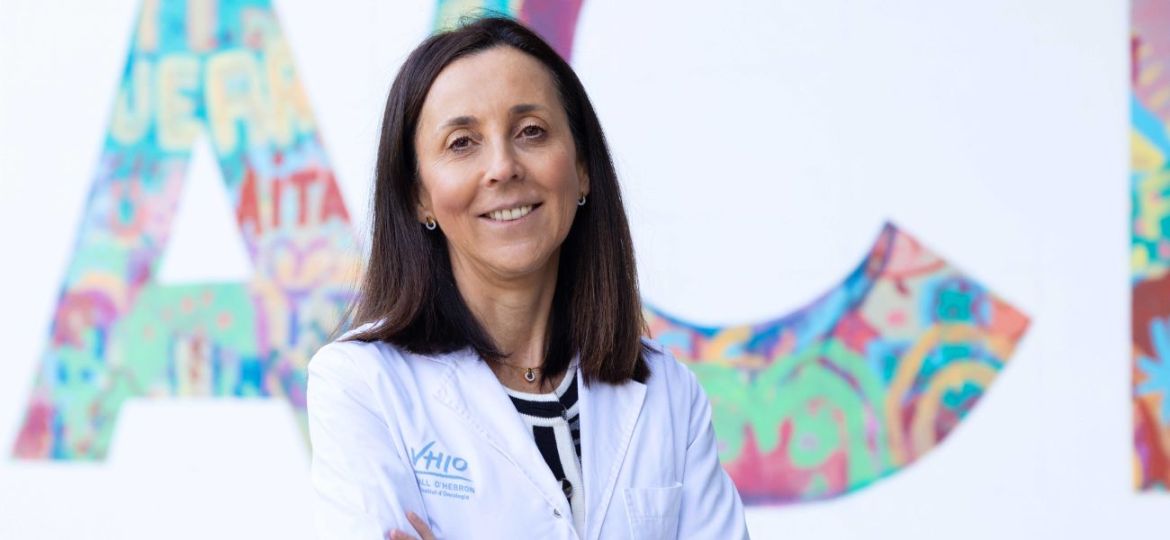
- The phase 2 multicenter TROPION-PanTumor study was designed to evaluate the efficacy of TROP2-directed antibody-drug conjugate datopotamab deruxtecan (Dato-DXd) as monotherapy and in combination with various anticancer agents across several tumor types.
- Results from the independent cohort assessing the anti-tumor activity and safety Dato-DXd as monotherapy in patients with recurrent advanced/metastatic endometrial or ovarian cancer whose disease had progressed on at least one line of platinum chemotherapy but no more than 2 lines of therapy for advanced or metastatic disease, have been presented today at the ESMO Congress 2024.
- Data presented by Ana Oaknin, Medical Oncologist at the Vall d’Hebron University Hospital and Head of VHIO’s Gynecological Malignancies Group, showed objective response rates of 27.5% and 42.9% in patients with endometrial and ovarian cancer, respectively.
The phase 2 TROPION-PanTumor03 clinical trial is an open-label, uncontrolled, multicenter study evaluating the efficacy, safety and tolerability of the investigational antibody-drug conjugate (ADC) datopotamab deruxtecan (Dato-DXd) as monotherapy or in combination with various anticancer agents in various advanced/metastatic solid tumors.
Presented today at the European Society for Medical Oncology (ESMO) Congress 2024* by Ana Oaknin, Medical Oncologist at the Vall d’Hebron University Hospital (HUVH) and Head of the Vall d’Hebron Institute of Oncology’s (VHIO) Gynecological Malignancies Group, preliminary results from patients who received Dato-DXd monotherapy in the endometrial cancer and ovarian cancer cohorts demonstrate encouraging anti-tumor activity and a manageable safety profile.
“Patients with advanced endometrial or ovarian cancer whose disease has progressed on standard first-line therapy usually harbor poor prognosis, representing an unmet clinical need. New and innovative therapeutic strategies must therefore be developed toward improving patient outcomes,” said Ana Oaknin, first author of this present study.
Dato-DXd is a TROP2-directed ADC. TROP2 is a protein found expressed in several solid tumor types, the high expression of which is associated with increased tumor progression and poor survival.
At data cut-off (March 1, 2024), the 40 enrolled patients with advanced or recurrent endometrial cancer and 35 patients with recurrent ovarian, fallopian tube, or peritoneal carcinoma were included—all with disease progression after at least one line of previous platinum-based chemotherapy—had received treatment with Dato-DXd monotherapy.
In the endometrial cancer cohort, the confirmed overall response rate (ORR) was 27.5%, disease control rate (DCR) was 85%, and median progression-free survival (PFS) was 6.3 months. In the ovarian cancer cohort, confirmed ORR was 42.9%, DCR was 91.4%, with a median PFS of 5.8 months.
“These preliminary data are encouraging and support the ongoing development of this investigational antibody-drug conjugate toward ultimately providing our patients with more effective treatment strategies,” concluded Oaknin.
The investigators will also retrospectively assess TROP2 expression in these patients to evaluate if the overexpression of this protein could be used as a biomarker for identifying patients who are likely to respond to treatment with Dato-DXd.
###
Reference
*European Society for Medical Oncology Congress 2024, 13-17 September, Barcelona, Spain
Session details
Mini oral session 2: Gynaecological cancers
Date: Sunday, 15.09.2024
Time: 14:45 – 16:15h
Chairs: Kathleen N. Moore (Oklahoma City, United States of America), Antonio
González-Martín (Madrid, Spain), Jean Emmanuel Kurtz (Strasbourg, France)
Speaker: Ana Oaknin (Barcelona, Spain)
Lecture Time: 14:45 – 14:50h
Abstract 714MO – Datopotamab deruxtecan (Dato-DXd) in patients with endometrial (EC) or ovarian cancer (OC): Results from the phase II TROPION-PanTumor03 study
A.Oaknin, J.E. Ang, S.Y. Rha, K. Yonemori, R. Kristeleit, C.-C. Lin, T. Satoh, P. Estevez Garcia, M.A.N. Sendur, L. Medina Rodríguez, A. Italiano, I. Lugowska, I. Ray-Coquard, A.Oza, J. Zhao, S. Gajavelli, J. Filant, S. Bodla, Y. Janjigian, F. Meric-Bernstam.
























